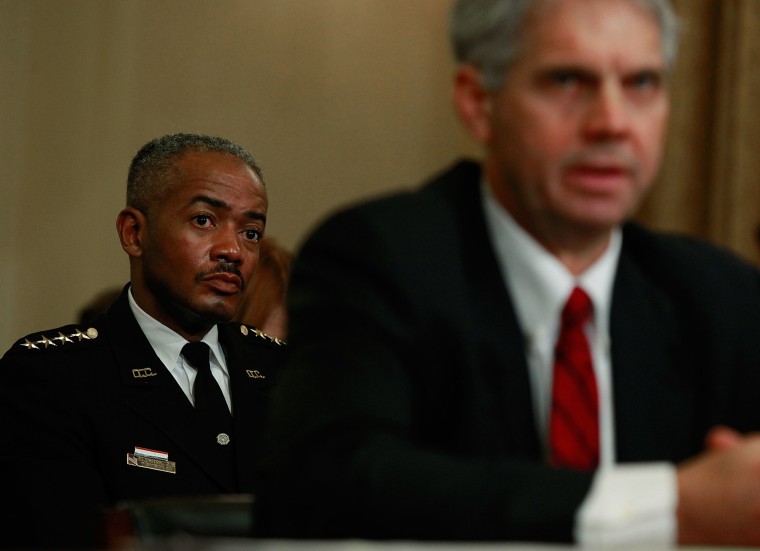Three Secret Service officers have been put on administrative leave after the security breach at last week's White House dinner, an episode President Barack Obama said hasn't shaken his confidence in his protectors.
The president nevertheless acknowledged Thursday that the "the system didn't work the way it was supposed to."
Despite the screw-up, the president was never at risk, Secret Service Director Mark Sullivan told Congress on Thursday.
"Pure and simple, this was human error" in which normal security protocols were not followed, Sullivan testified. So far, the service's continuing investigation has found three people from the agency's uniformed officer division responsible for the security breach and all three have been taken off duty until a review of the matter is completed, he added.
Sullivan had said early on that it was the Secret Service's fault that a Virginia couple made its way to the administration's first state dinner without an invitation.
Obama says he still feels safe
But as criticisms grew, the White House stepped up Wednesday to shoulder some of the responsibility. The White House social office was told to return to a long-standing policy of having White House employees stationed at security checkpoints to help the Secret Service clear up any problems over invitations to these exclusive events.
For all the uproar, Obama said he still feels safe in the mansion and trusts the Secret Service to protect him and his family.
"I could not have more confidence in the Secret Service," Obama told USA Today and the Detroit Free Press.
Some House lawmakers, however, weren't as assured.
The chairman of the House Homeland Security Committee, Rep. Bennie Thompson, said, "We're all fortunate that this diplomatic celebration did not become a night of horror."
"How in the world could this couple get past the Secret Service?" Rep. Michael McCaul, R-Texas, asked.
Sullivan responded: "I've asked myself that question 1,000 times over the last week."

The couple — Tareq and Michaele Salahi — and White House social secretary Desiree Rogers were also invited to testify Thursday, but all three declined.
Committee staffers are already drafting subpoenas to compel the two aspiring reality TV stars to testify.
The committee's top Republican, New York's Peter King, said it's critical that the White House allow Rogers to testify as well. Sullivan told the lawmakers that the Secret Service and the White House social office together developed the security plan for the Nov. 24 dinner. Thompson is reluctant to subpoena Rogers — an Obama political appointee — because he maintains the Secret Service is responsible for security. King said he will ask Thompson to amend the Salahi subpoena to include Rogers.
Separation of powers
White House spokesman Robert Gibbs cited the separation of powers and a history of White House staff not testifying before Congress in explaining why Rogers, herself a guest at the dinner, wouldn't testify.
As a candidate, Obama supported Congress' right to subpoena White House employees in cases of wrongdoing, even if it meant as president he might be weaker for it. So far, questions have been raised about Rogers' judgment, but no one has suggested she broke any law.
"This blanket notion that you can't subpoena White House aides where there's evidence of genuine wrongdoing I think is completely misguided," Obama said last year. "We're a nation of laws and not men and women so, you know, and that's a precedent I don't mind living with as president of the United States."
As for any penalties the Salahis might face, there was no indication that the Secret Service had referred the incident to federal prosecutors for criminal charges, but the service's internal probe isn't finished.
Will the couple be charged?
Former assistant U.S. attorney Stephen Ryan said he thinks it's unlikely the Salahis will be charged, but the government could theoretically prosecute them for making false statements to the Secret Service, a felony carrying a maximum penalty of five years in prison. That, however, would depend heavily on what the couple told the screeners at the White House that night, which has not been disclosed. "It would seem to me that could cover this event," said Ryan, who once prosecuted a White House fence jumper.
Another possible charge might be trespassing but that could prove difficult because they were granted permission to enter the property.
At the hearing King asked if the Salahis would have been able to penetrate the White House if a representative of the social office staff had been present at the checkpoints for clearance assistance. Sullivan said, "It would have helped."
He added that the agency is still reviewing what security protocols weren't followed.
Couple denies wrongdoing
On NBC's "Today" show this week, the Salahis maintained they did nothing wrong. They have been trying to land a part on a Bravo reality show, "The Real Housewives of D.C.," and were filmed by the TV show around town as they prepared for the White House dinner.
On the eve of the hearing, the Salahis' publicist, Mahogany Jones, said they believe "there is nothing further that they can do to assist Congress in its inquiry regarding White House protocol and certain security procedures."
Jones said the White House protocol at the dinner "was either deficient or mismanaged" and that "there were honest misunderstandings and mistakes made by all parties involved."
After Sullivan left the hearing room, committee staff placed two name cards on the witness table for the Salahis, and Thompson spoke briefly to the empty witness table as photographers snapped away.